One of the quickest ways to enjoy an instant smile makeover is with professional teeth whitening, one of the most popular procedures in cosmetic dentistry. Opus Dental Esthetics offers two whitening options so you can choose which best fits your needs and goals.
We only use carefully selected professional tooth whitening brands that yield optimal results with minimal sensitivity to teeth and gums. Our dental office offers Kor Deep Bleaching and Take Home Whitening with custom whitening trays.

Which Type of Teeth Whitening is Best For You?
At Opus Dental Esthetics, we offer both in-office and take-home whitening treatments to help you get the bright smile you want. Each option is designed to fit different needs and lifestyles, so you can choose what works best for you:
Deep Bleaching 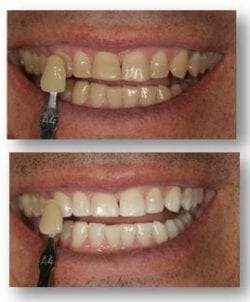
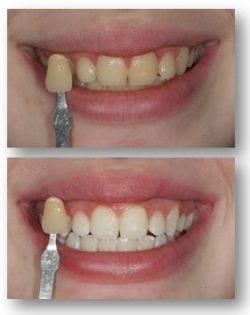
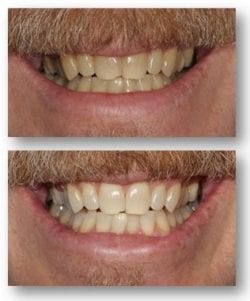
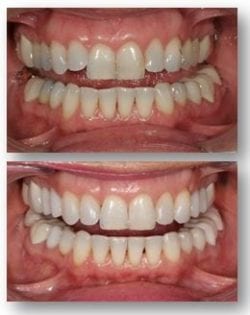
We offer deep bleaching for patients interested in the most dramatic results possible. Deep bleaching uses a combination of two to three in-office treatments and take-home treatments. A deep bleaching treatment is different because it offers significant teeth whitening, even for patients with dark teeth or tetracycline staining.
Deep bleaching restores the teeth’s ability to absorb oxygen. The oxygen from the deep bleaching gel is absorbed deeply into the tooth. It dissolves stain molecules and whitens teeth to previously unattainable levels. The results of deep bleaching last longer than those of more conventional teeth whitening methods.
Take-Home Teeth Whitening
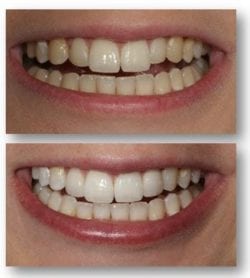
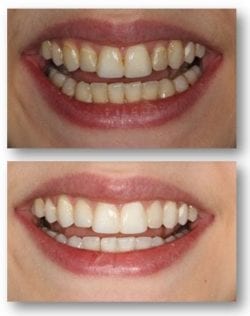
Take-home professional teeth whitening is popular because of its convenience and affordability. This safe and simple treatment is more effective than over-the-counter teeth whitening products and less expensive than our other whitening procedures.
An impression of your teeth is taken when crafting custom teeth-whitening trays. Our dental assistants will walk you through the process. They will show you how to apply the gel and discuss how long your bleaching trays should be worn daily to achieve your desired results. At-home teeth whitening is also great for touch-ups and accelerates other whitening methods. It can maintain your beautiful white smile after any whitening treatment.
Are There Other Ways to Whiten Teeth?
Teeth whitening can be a fantastic way to enhance your smile, but it’s not always the right solution for everyone. Some people’s teeth may not respond well to whitening treatments, and there are several reasons why this can happen.
Common reasons for tooth discoloration include lifestyle choices like drinking coffee, red wine, or tea and using tobacco products. These substances can leave stains on teeth, making them look darker over time. In addition, aging naturally affects the color of teeth. As we age, our teeth can lose their brightness.
However, some types of tooth discoloration come from within the teeth, called intrinsic stains. These stains can occur due to various internal factors. For example, if a tooth is damaged—from wear and tear over time or from an injury—it can expose the layer beneath the enamel known as dentin. Dentin is darker than the bright, white enamel, so a damaged tooth may appear more yellow or gray.
Certain medications can also affect the color of your teeth, leading to discoloration that isn’t related to external factors. Unfortunately, these intrinsic stains often do not respond to professional whitening treatments.
During your consultation at our office, our experienced cosmetic dentist will examine your teeth and discuss your oral health and lifestyle habits. If teeth whitening isn’t suitable for you, don’t worry! We have several other options to help brighten your smile.
Porcelain Veneers
Veneers are thin shells made from durable porcelain custom-made to fit over the front surface of teeth. They are perfect for covering up stains, chips, or gaps between teeth.
Veneers can improve the appearance of your smile by giving it a bright, uniform look. The best part is that they can last for many years with proper care. If you want a beautiful smile that looks natural, porcelain veneers might be the right choice for you.
Tooth Bonding
Bonding is another fantastic option for improving your smile. This treatment involves applying a tooth-colored resin material to the affected teeth. It can fill in gaps, change the shape of a tooth, or cover up stains.
Tooth bonding is a quick and cost-effective solution that can often be done in just one visit to our office. The resin is carefully shaped to match your natural teeth, making it look seamless and natural.
Dental Crowns
Crowns can cover a whole tooth to restore its shape, size, and strength. Crowns can also improve the appearance of your smile. We can match crowns to the color of your natural teeth. Crowns are particularly useful if you have a tooth that is severely discolored or damaged.
How to Prevent Tooth Stains
After you complete teeth whitening treatment, you want to keep your teeth bright. There are several things you can do at home to prevent further tooth stains:
Stop Smoking
Smoking cigarettes, vaping, and other tobacco products can yellow your tooth enamel. Tar, or tobacco residue, can easily stain teeth a yellow-brown. You can prevent further staining if you receive whitening treatment and quit smoking.
Avoid Certain Foods and Drinks
Sodas, juices, wines, berries, and tomato-based sauces can easily stain your teeth. These foods and drinks can also contain acids that break down your enamel over time. Avoiding foods and drinks that stain can keep teeth bright after whitening treatment.
Brush and Floss
Stains from foods and drinks can affect your teeth even after whitening treatment. Plaque buildup can also change the color of your teeth. Flossing before brushing can remove food debris and plaque between teeth, and brushing can remove plaque and temporary stains from foods and drinks. After you whiten your teeth, brushing and flossing will help you maintain your results.
Teeth Whitening FAQs
Teeth whitening is the most popular cosmetic dentistry service in Philadelphia, PA. Learn more by reading the answers to these commonly asked questions.
What other types of teeth whitening options are available?
Our doctors make beautiful, natural-looking porcelain veneers, dental crowns, and tooth bonding as alternative whitening treatments. We may recommend these options if your teeth do not respond well to traditional whitening treatments.
Will teeth whitening cause tooth sensitivity?
Over the years, the whitening process has been refined to minimize sensitivity issues. However, some patients may still experience temporary tooth sensitivity after whitening their teeth.
If you do get sensitivity, it should fade in a few days. Contact us if you have sensitive teeth, and we will find a solution for you.
What is better: teeth whitening at the dentist or teeth whitening kits from a store?
Both options will whiten your teeth based on how long you want them to last and how quickly you want white teeth. We recommend professional teeth whitening over the over-the-counter options for the best results. Our dentist can customize professional whitening to meet your goals. This treatment is also more effective, and there is much less risk of tooth sensitivity, a common side effect.
How often can I whiten my teeth?
Your diet, oral hygiene routine, and whitening method will impact how often you need touch-ups. Deep bleaching treatments and take-home trays do not require frequent touch-ups and can last 6 to 12 months. However, if you eat foods that stain your teeth and don’t brush and floss thoroughly, your teeth can stain sooner rather than later.
Can I permanently whiten my teeth?
Many people want to know if they can permanently whiten their teeth. No treatment will keep your teeth permanently white.
However, treatments like veneers or crowns that cover teeth can last. Veneers can cover the front of all teeth in your smile line. We use porcelain veneers because they can be color-matched to your desired tooth shade for many years. Crowns are best for patients with damaged and stained teeth. They cover teeth like caps.
Does insurance pay for teeth whitening?
No. Dental insurance does not cover the cost of teeth whitening treatments, as insurance providers do not consider this cosmetic treatment necessary. However, we do provide financing options to help our patients afford great dental care.
Brighten Your Smile
Get teeth whitening in our Philadelphia, PA, dental office today. Call (215) 395-6076 or schedule an appointment online. If you have more questions, let us know at your next visit.
